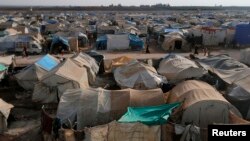The international human rights group Amnesty International says the world community’s failure to deal with the growing number of Syrian refugees fleeing into Turkey has led to a crisis of unprecedented proportions.
In a report released Thursday in London, Amnesty says refugees face push-backs and live fire at the border and hundreds of thousands live in destitution. Analysts are raising new concerns about the refugees as winter approaches.
Turkey hosts more than one-half million Syrian refugee, which is about half of the total number of Syrians who have fled their war-ravaged country since 2011.
Human rights issues
Turkey says it has spent $4 billion to help the refugees, and Amnesty is quick to praise the country for shouldering so much of the crisis.
It says, however, refugees are facing serious risks to human rights.
Amnesty's Anna Shea said one of the main problems is the shortage of official crossing points were refugees can enter Turkey from Syria.
“There are only two fully open and operational border crossings along Turkey's 900 kilometer long border with Syria. So people have to travel through dangerous territories and probably the most vulnerable people are not able to leave Syria,” said Shea.
The Amnesty report says many Syrians are turned away at those crossing points if they are not carrying a passport. Many Syrians instead attempt to cross at irregular crossing points.
“Once people do reach these irregular crossings they have to use the services of smugglers very often and as our research documents they face abuse by Turkish border guards," said Shea.
Border violence
Amnesty reports at least 17 people have been killed by border guards using live ammunition at unofficial crossing points between December 2013 and August 2014. The human rights group says many others have been beaten and pushed back into Syria.
Ana Oprisan, a development expert from the School of Oriental and African Studies in London, said that for those who do manage to enter Turkey, the living conditions are poor.
Only 220,000 refugees are living in well-resourced camps; the remaining 1.3 million are fending for themselves.
Oprisan describes seeing whole families living in tents that have been erected on rooftops, and watching children running around barefoot in freezing weather.
“Winter came already. In certain areas of Turkey it has already snowed. So living in a tent is not a proper condition to survive in," said Oprisan. "But it's not only the winter. It's the fact of the basic needs -- no food, no nothing, no possibility to actually work.”
International help needed
Amnesty says the international community has to do more to help the situation.
According to Turkey, only 15 percent of refugees living outside official camps receive assistance from humanitarian agencies and organizations.
“It’s the response of the international community to the Syrian refugee crisis, which as been nothing short of shameful. The funding commitments are appallingly low,” said Shea.
The United Nations earmarked just under $500 million for Turkey in its 2014 regional funding appeal for Syrians. According to Amnesty International, up until October 2014, only 28 percent of that had been committed by international donors.




